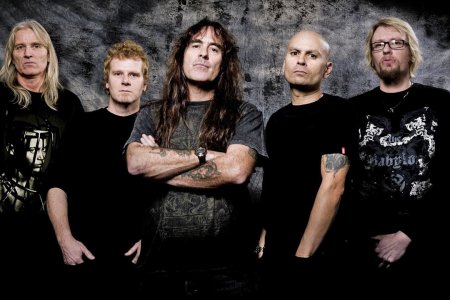„Deep Purple are still playing and releasing albums?“ That’s a question, I believe you won’t be able to hear in the recent years when we take a look at the activity of legendary British band since their 2013 release Now What?!. Concert-wise they are touring within one long goodbye tour, but they are releasing new albums regularly. Also, due to a cooperation with earMUSIC they are effectively letting the world know about it. It was possible to arrange this interview in July 2020 due to a long term contact and it was really huge honor to hear Ian Paice’s royal voice again. Next to a new album, modern approach towards music marketing, we also spoke about band’s chemistry, his traditional values within gear or a fascination for discovering music treasures within albums from twenties and thirties.
This interview came out originally in the December/January issue of Czech magazine Muzikus.
Photo credit: Ben Wolf
Hello. Thank you for finding time.
Hello. No problem.
We spoke together a couple of years ago for a front cover interview for Slovak magazine Rock Hard. This time it is for Czech magazine Muzikus. First of all, I have to ask you, how are you trying to enjoy the summer season?
I don’t think anybody’s enjoying it. Yeah, I should be working now and that’s impossible. We, you know, we are like everybody else, we are waiting for this thing to get under control or go away. We don’t have any serious work next year. Well, we’re all stuck in the same terrible boat.
This is frustrating. But I was hoping if you managed to spend the corona days doing something you let say kept on a side, until the day will come. You know, build something in the in the garage, do something in the garden or learn a new language.
I’ve got many hours of great video footage of studio stuff and now I am putting some of that stuff out into the public space, so people can see it. Something they probably wouldn’t normally see. It’s taking a little while and that’s fine. It is taking me three or four days a week. I’m doing that and I also do sessions for people in my little studio. So I do get to see a drum kit every now and again. (Laugh) But in general this year seems as a terrible waste of time.
Let’s say Ian Gillan mentioned lately, he spent these corona days by listening to a lot of music. What about you? Were there some interesting discoveries for you lately, music-wise?
I really don’t have a lot of time for that. I’m doing this YouTube thing. And it’s taking a lot of time because I’m not perfect in remembering where my stuff is. (Laugh) So I know I’ve got something somewhere, but I have to go through like twenty different hard drives. Just finding the stuff takes me half a day. (Laugh) And then when I’ve got it, it takes me another two or three days to sort it into a proper order, so people can watch it. So once I’ve done with that, all I want to do, is to sit down with a beer in front of the television.
What do you love to watch these days?
I like to binge-watch. Once I’ve been working for six or seven hours a day in the studio, I’ll just pick something like The Blacklist and watch three or four episodes straight off. And when I start to fall asleep in the middle of an episode then I go to bed.
I have to congratulate you on the amazing work you guys did again, this time on the latest Whoosh! album. I was enjoying the press version for a couple of days, as well as EP Record Store Day and a single Nothing At All for the past two weeks. All I could say, it is another mature piece of work from all of you guys.
Thank you. You know, things do evolve. Sometimes we get asked by real devoted fans who are maybe stuck in the past a little bit why we don’t record things like Highway Star anymore. Because that was then and this is now you know and we are different people and the music has evolved. And the world has changed and you have to reflect what you see around you and what you feel and how you are as people now, you know. I look back at some of the film clips of me playing when I was in my twenties and that’s a different guy. You know, that guy could do things then that I can’t do now because I can’t. I just forgotten what it was I did. But now I can do things I didn’t even know existed when I was in my twenties. So, everything evolves and changes and hopefully goes forward. It’s never gonna be the same. You know, if we recorded another Highway Star type track, it wouldn’t be as good as Highway Star. It created a benchmark it’s inside their psyche. They know it and it means different things to them. A new track would never do the same thing. So why would you try and recreate something which is impossible?

I generally feel if you trust your first instinct, on nearly anything in life, it’s usually the right thing.
Whoosh!
If we look more closely into the album through certain tracks, I was impressed with your telepathical connection with Don in Nothing At All. He played there an impressive Harlem-gospel keyboard solo, while you were supporting him peacefully in the philosophy: “I got you back”. How did you feel in that moment?
When you’re writing these things, you go into the rehearsal room with nothing. At the end of the day, you come out with something, which is the only possibility to create from the people involved. When you have no blueprint, you must choose the most logical thing for your own satisfaction to compliment what you hear going on around you. So what you end up with is a very organic, very natural way of helping each other. And it’s not even a conscious thought. Don is doing his thing, Steve’s doing his, so I have to do this to make it work. There is very little flexibility. You can do different things, but you choose hopefully, the correct thing, the best thing. And that’s the first thing you go to. And if it feels right, that’s what you stick with. I generally feel if you trust your first instinct, on nearly anything in life, it’s usually the right thing. So when I hear one of my pals doing something musically, it will trigger something in me – an emotion or a musical solution to compliment what they’re doing. It’s not even a conscious thought. You just have to go that way. That’s correct, and nothing else would be as good.
Perfectly said, Thank you for that. If we move to another great track from the album it is Man Alive, where a metronome has a strong role. I was just wondering if you have some unique memory or a unique story with metronome when it became your friend rather than an enemy.
(Laugh) Well, that little clock sound you heard, I played that originally on the snare drum. I was playing that “deck deck deck” sound. I think what Bob did either replace it or he just used different equalization to give it two different sounds. But initially, it was just me on the snare drum, to give that “deck deck deck” feel to it. Most modern rock and roll now is recorded with click-track. We are getting programmed to expect perfect timekeeping. Old records don’t have that. Next to it, we know them inside out. They’ve been with us since we were kids. We don’t expect anything different from the way they sound. And the fact that the tempos move a little bit, is a part of the charm of those old records. But even musicians are now being brainwashed into believing that everything has to be machine time. There’s nothing you can do about it. We’re surrounded by it, by everything we hear on the radio. Everything new is now compromised slightly for the digital world of recording. I mean jazz is not affected that way because it’s a little more loose. And classical music is working on the time of a conductor. The rock and roll is a different vehicle for music and certain things are more important. The sound of instruments is more important. The precision that you have to play to make it all work, in something which quite often has no inherent swing in it, is quite straight. And to try and make it work is the precision that makes it work. And that’s the slight compromise we’ve had to make with the digital age. You’re going to edit things digitally. Computers work with things in little chunks. And chunks are much easier to cut if they’re all the same. If they start moving around, it’s more complex. It’s not quite so enjoyable to record. Because you don’t have an absolute freedom like you did in the old days. By the same time, you can get recording done very, very quickly. You know, it’s if you take more than five takes on a song in a digital age, you’re wasting your time. In those first five days, you’ve probably got it. You might not get it all in one take, but between those five takes, this bit here, that bit there, you put it together, nobody ever knows, because the editing is so perfect, that you have the song. So that is a bonus. Because sometimes back in the old analog days, if you had a song, you really were hopeful of being successful, you might have to play it a lot longer to get that one take, where everybody did everything perfectly. And now, that’s not the same. Now making a record is so much easier. I mean, the machines do help you but you have to understand that there is a payment for that. Click-track is one of those payments.
When you’re talking about the modern ways and modern approaches, I believe one of them was to release this three track EP to sort of get the world more interested for the new album. Therefore I was wondering, if it was mainly the idea from your promotional team?
The world is different. When we used to go to a record shop and buy records, that’s gone. We don’t do that anymore. The record shops aren’t there. You know, there may be one or two left in major cities, but that’s it. You’re more likely to buy a record in the supermarket now. Next to it, so much is done online. You have to accept that there are people who are selling the records. Because we are just sticking music together and others are putting things in the shops. So you have to expect that the people who are still running the few good record companies that are around, know what they’re doing. So the whole idea of marketing a record is now different. Talking about our team and the records we’ve put out with them, they’ve done an incredible job. They’ve made a lot of people aware that there is a new record out. And that’s the only thing you can do. You have to let them know that there’s something there. And if you can do that very efficiently, you may just interest enough people to buy the record and make it successful. But that’s the way it works now. It’s a different world from the old days where you would, you know, do a couple of TV spots and then people go to the shop and buy it. It’s just not the same thing anymore.
While reading one of my favorite books from Erich Maria Remarque – Three Comrades, I came across a beginning of No Need To Shout which really surprised me. You probably did many interviews lately, so I was just wondering how many people told you that the first five seconds of this song totally sound as Perfect Strangers?
Oh yeah, the organ intro. Well, that’s one of my favorites. I think it’s a lovely obvious rock and roll track, but I love that track. I think it shows that this doesn’t sound like an old band when you hear that track. This sounds very much today. It’s very powerful. Roger was the instigator. He’d woken up in the middle of the night and said he has this little bass riff in his head. When we came into a rehearsal room the next day, he said: “I’ve got this!” We haven’t got this at the writing session that’s happened earlier during pre-production. But we all liked it so much. I mean, within, I would say two hours, we had the basic construction of the music that would be the backing track. It was that easy to do. And it was that much fun to do. And when we heard the first playback from the tapes in the studio, we were very excited about it. It sounded wonderful. A lot of fun making that track. I really enjoyed it.
Glad to hear that. If I can say my top favorite from the album, so far, is The Power of the Moon. I’m a big fan of melancholic music, which is helping me a lot to calm my mind. It lets me to go through some of the older experiences and make peace with them, as well as to have some new epiphanies. But I was just wondering, what was your personal approach towards this melancholic track?
You know, what happens with us, is the last thing that gets added are the lyrics and the vocals. If we make a piece of music, Ian will tell us, if it’s impossible to make a song out of it. If we construct something that would work, he will then work away quietly by himself with lyrics that are triggered by the emotion he feels from music. And when you’re playing a piece of music, which has an obvious emotion, whether it’s excitement, or melancholy, or sadness, or whatever, you find the solution that fits what you’re hearing your friends are playing. And the idea is that you are not instrumental, you’re not bunch of individuals. You are one brain doing the same thing. You’re coming at it from different directions, but you are achieving the same thing from the emotion that you feel in the music. So we have a situation: “Okay, I can make a song out of this.” So we give him the best possible track we can, to enable him to put the top end on it. So basically, you know, me personally, once I finished my recording, I get the hell out of there. I think I was in Nashville for eight days for the recording, and then I left because I don’t want to hear it change every day. Once I’ve done my thing, and I’m happy with it, I get out of there. So when I hear it, it’s like you’re hearing it for the first time as a finished song. I’m not interested in checking its growth. When we’re in a studio, I’m sure the guys trust me to come up with the right drum track. And I trust him to come up with the right vocal track, and I don’t want to hear it until it’s finished. You know, I might have a word in the mix, maybe something I’d like to change. But the artistic input, that’s fine, I trust each of my pals to do exactly the right and the best job.

We think we’re in control of everything, but we are very fragile. We’ve seen what a virus can do to society.
Space, Start Trek & Radioactive Waste
How did you guys come up with the graphical concept of the album?
We have an amazing artistic design department. And again, when you’re so close to the music, sometimes you don’t see the same way that somebody outside the band sees it. So these people in this department, they work on the emotion and the picture of a story in their heads and then they submit them to us. And we will pick the one that we think is the best and one closest visually to what the music is saying. Some bands are very lucky to have a visual artist inside the band. We don’t. However we have the opportunity to use people which are very good at that sort of thing. And they came up with many different ideas, something that you would probably never have thought of. Again, that’s exciting. So when they came up with the spaceman looking very confused on this somewhat crazy world that we live in, I think that was a wonderful observation. Especially with the lyrics and some of the songs on this record which are very much about what’s going on today. Even the Drop the Weapon song, you know, how many times are we hearing about people getting shot, killed for very little and not having a gun. And you know, the Man Alive is about the fragility of human beings on this planet. We’ve seen what a virus can do to society in the last four or five months. You know, we think we’re in control of everything. We can be blown away in another hundred years, you know? And what’s going on in the world today, we look around us, and we know that we could do it better. All the crap that’s going on in the ocean, all the stuff we’re hiding underneath the soil, and we can’t do anything with all the plastics and the radioactive waste and of all of that shit. We can do it better! Because the planet will be fine. The planet will go on. We will only f*ck ourselves up in the end.
Now I just see in my head George Carlin’s stand up: “The planet is fine, the people are f*cked.”
Exactly! (Laugh) And it doesn’t need to be that way. You know, it could be better. It wouldn’t take a lot of effort to make it better. Maybe not perfect. Just better.
Absolutely. But at the same time, I’m also really interested to know what is your personal relationship towards space and space exploration? Since I was a kid, I was always obsessed with that. With all the respect, I am thirty years old, but are you’re coming from the days when the space exploration was really wild and the visions of future possibilities were unlimited.
Well, I think we did live through a very exciting time. And then the first man on the moon and the first guy going into space and all that stuff. It was still in the realms of science fiction. A lot of it still is. Whether we will ever be able to inhabit Mars, or would we want to? (Laugh) I don’t know. I still think we’re a long way off from Star Trek where we can zoom around between different galaxies. I think that’s a long way off yet. (Laugh) I don’t believe we’ll get that far. But the imagination is beautiful. Where do you think the iPad came from? A very young Steve Jobs saw, you know, Star Trek guy doodling an eye on a pad and he made that science fiction. He made science fact. So who knows? I think the imagination of fiction writers is incredibly useful, because they do think of things that nobody else has thought of. And then it takes an engineer or a scientist or just a genius, to say: “Yes, we can do that.” And that’s exciting.
Now I would like to move to Bob Ezrin. Your cooperation reminded me of a great quote from Ennio Morricone, which said: “I’m just too old to work with new people.” As you cooperate with Bob for so long, did your relationship move to a point where it’s hard to criticize each other or is it much easier based on the trust?
It’s not difficult at all. When we are going into the studio, or before that when we are preparing the songs to be recorded, five of us and Bob, we’re on the same page. We want to get the best record we can do in the studio. Plus we want to do it as efficiently as we can and as quickly as we can. And the great thing about working with Bob, he’s not just a great producer. He has a great musical knowledge. And if there’s something not working, he can explain that to us in a musical way. So that we understand where the problem is. And we may not know there is a problem, because when you’re in the studio working, you’re so concentrated on your own little part. Obviously, if there’s a big mistake from one of your friends, then you know about it. But you’re not listening to them the same way you listen to yourself. So if we get to a point in a song where we don’t realize something’s gone, well, Bob is in the control room and he’s hearing the whole picture. And if something is wrong, I can be wrong next time and next time. So he will come out and he will explain why, for him something is losing its power. But if you’re going to have people like Bob, in the studio with you, you take 100% of Bob. You take the ability to get great sound, but you take that musical knowledge and you’re thankful for it. And it saves time. You know, if you’re playing a track, and you do five tracks, and that one piece is wrong in everything, you have to do it again. But if you play the track once and Bob sees a problem, he comes out and you fix it, and maybe only play the track three times. And at that point, you’ve captured something new, exciting for the musicians to play because we have no preconceived idea of what the tracks going to be. Once you start playing something ten or twelve times, in that moment the creativity is gone. You just started to copy what you did before. And that changes the whole dynamic of the piece of music. It becomes perfect, but it’s no good. There’s no excitement in it, there’s no spark of humanity in it. So if you can capture those first 2, 3, 4 takes, that’s when you get it!
When you started talking about the machines and being completely natural and human, there is still an aspect of surprises from the gear. Were there lately any surprises from the gear and equipment?
Not so much from the drum kit. You know, I know what I like. And you get to a point where you don’t want to change the sound you hear from a cymbal, a bass drum or a snare drum. You’ve perfected it over the last few decades, and you’ve got to the point where you’re happy with it. You can get a drum kit, you can change sounds wherever you want. But every time I change it, it’s something I don’t like as much, as what I have now. So I’m in that position of oneness with the instrument. I’m happy with what it is, and I don’t want it to do anything else. I think with guitars it’s probably very similar, even though some effect boxes are developed every now and then and they can find new sound. Keyboards especially because apart from the old physical things like Hammond organ or pianos, the electronic side, the computing side of keyboards is an ever growing technology which brings more possibilities. The same way I think great bass sounds are great bass sounds. I don’t think we got anywhere else with a four string bass. You know, I think we’re at the point where we’ve got it all. I think that’s where it’s at. Keyboards are the main thing that can change because of the nature of the electronic keyboards that most people use.

The fact that the tempos on old records move a little bit, is a part of the charm of those old records.
Coming towards the end, I would like to ask slightly philosophical question, if you discovered something lately about yourself, as a player? I watched one great interview with Neil Peart from Rush, where he said he always played according to his feelings. But as he was growing older and meeting older players, he started to understand the depth of each movement of his hands. Did you experience anything similar in this phase of your career?
Yeah, but my way is different from the way Neil did it. Mine is listening rather than looking. I listened to lots and lots of old records. Sometimes from the turn of the last century, but quite often from the twenties and thirties. And I’m looking for feels. I’m looking for little patterns that are so old, that people forgotten about them. Because in Western music, there’s nothing new. Everything’s been done. On some of those wonderful old records, there are drummers who really didn’t know what they were doing. But they had, something and you listen to the record go: “Well, I would never have thought of doing that.” Then you take it, and you try to modernize it. Music moves on, some of the things that were done in the twenties, thirties, and forties go out of fashion, they go out of style. So they don’t get played. It doesn’t stop them being good, they just people stop playing them. So I go back, and I try and find these little hidden pieces of magic and try to bring them up to date. And that’s fun. You know, you may go through a hundred of records and find nothing. But on that 101st record, you may find something, and it may only last for five or six seconds but that’s the one. If you go back two hundred years, there’s was no such thing as a drum kit. There was a guy with a bass drum, another guy with a snare drum and a guy with a pair of cymbal who need to match up to support soldiers. Later these drums were used together in theaters. So this is a new instrument, but its change in the last 140 years is amazing. Going back to the beginning, you can find some real gems, some real magic stuff that nobody knows about.
I will say this was the perfect ending for our interview. I really appreciate your honest and great answers as usual. It was really nice pleasure talking to you again. Wish you all the best and if he situation will allows it, it would be great to see you live again.
We are moving everything from this year for next year. God willing. It’s just a delay. Thank you as well. Cheers.






